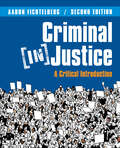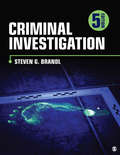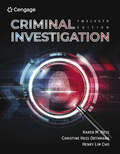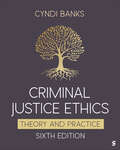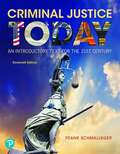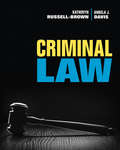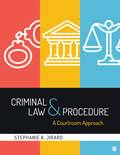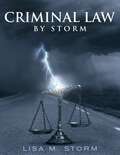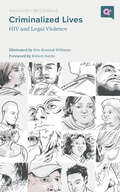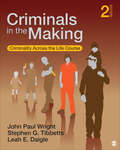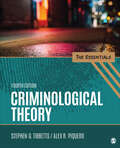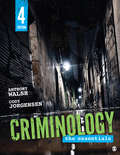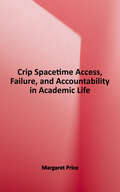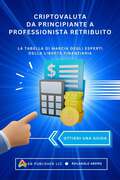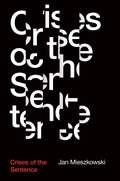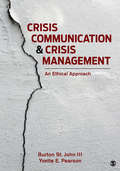- Table View
- List View
Criminal (In)Justice: A Critical Introduction
by Aaron FichtelbergCriminal (In)Justice: A Critical Introduction examines the American criminal justice system and the social forces that shape it. Using a conversational voice, the book challenges readers to consider the inequalities in the criminal justice system as well as in the broader society it is designed to protect, then ask, "What can I do to make this better?" Author Aaron Fichtelberg uses a unique, critical perspective to encourage students to look closer at the intersection of race, class, gender, and inequality in the criminal justice system. Covering each of the foundational areas of the criminal justice system—policing, courts, and corrections—this book takes an in-depth look at the influence of social inequality, making it ideal for instructors who want students to critically assess the American criminal justice system in a very approachable way. This second edition comes at a time when there is a profound awareness that the criminal justice system reflects deep and systematic inequalities in American society and has been updated to include some of these monumental changes. This title is accompanied by a complete teaching and learning package. Digital Option / Courseware SAGE Vantage is an intuitive digital platform that delivers this text’s content and course materials in a learning experience that offers auto-graded assignments and interactive multimedia tools, all carefully designed to ignite student engagement and drive critical thinking. Built with you and your students in mind, it offers simple course set-up and enables students to better prepare for class. LMS Cartridge (formerly known as SAGE Coursepacks): Import this title’s instructor resources into your school’s learning management system (LMS) and save time. Don’t use an LMS? You can still access all of the same online resources for this title via the password-protected Instructor Resource Site.
Criminal (In)Justice: A Critical Introduction
by Aaron FichtelbergCriminal (In)Justice: A Critical Introduction examines the American criminal justice system and the social forces that shape it. Using a conversational voice, the book challenges readers to consider the inequalities in the criminal justice system as well as in the broader society it is designed to protect, then ask, "What can I do to make this better?" Author Aaron Fichtelberg uses a unique, critical perspective to encourage students to look closer at the intersection of race, class, gender, and inequality in the criminal justice system. Covering each of the foundational areas of the criminal justice system—policing, courts, and corrections—this book takes an in-depth look at the influence of social inequality, making it ideal for instructors who want students to critically assess the American criminal justice system in a very approachable way. This second edition comes at a time when there is a profound awareness that the criminal justice system reflects deep and systematic inequalities in American society and has been updated to include some of these monumental changes. This title is accompanied by a complete teaching and learning package. Digital Option / Courseware SAGE Vantage is an intuitive digital platform that delivers this text’s content and course materials in a learning experience that offers auto-graded assignments and interactive multimedia tools, all carefully designed to ignite student engagement and drive critical thinking. Built with you and your students in mind, it offers simple course set-up and enables students to better prepare for class. LMS Cartridge (formerly known as SAGE Coursepacks): Import this title’s instructor resources into your school’s learning management system (LMS) and save time. Don’t use an LMS? You can still access all of the same online resources for this title via the password-protected Instructor Resource Site.
Criminal Investigation
by Steven G. BrandlCriminal Investigation, Fifth Edition offers a comprehensive and engaging examination of the criminal investigation process and the vital role criminal evidence plays. Written in a straightforward manner, the text focuses on the five critical areas essential to understanding criminal investigations: background and contextual issues, criminal evidence, legal procedures, evidence collection procedures, and forensic science. In the new edition of this bestseller, author Steve Brandl goes beyond a simple how-to on investigative procedures and draws from fascinating modern research, actual investigative cases, and real crime scene photos to give students practical insights into the field of criminal investigation today. This title is accompanied by a complete teaching and learning package.
Criminal Investigation
by Steven G. BrandlCriminal Investigation, Fifth Edition offers a comprehensive and engaging examination of the criminal investigation process and the vital role criminal evidence plays. Written in a straightforward manner, the text focuses on the five critical areas essential to understanding criminal investigations: background and contextual issues, criminal evidence, legal procedures, evidence collection procedures, and forensic science. In the new edition of this bestseller, author Steve Brandl goes beyond a simple how-to on investigative procedures and draws from fascinating modern research, actual investigative cases, and real crime scene photos to give students practical insights into the field of criminal investigation today. This title is accompanied by a complete teaching and learning package.
Criminal Investigation
by Christine Hess Orthmann Kären Matison Hess Henry Lim Cho Jennifer Molan ChoMaster modern investigative principles and practices using the field-based approach strongly grounded in current research with Hess/Hess Orthmann/Cho/Molan's CRIMINAL INVESTIGATION, 12E. This best-selling text introduces established tools, practices and policies while detailing the latest innovations in investigative technology and science today. The authors clearly demonstrate techniques and practical applications using a captivating, reader-friendly presentation. The latest discussions introduce advancements in DNA evidence, incident review and solvability factors, terrorism and homeland security, electronic data searches, new case law, forensics and physical evidence, use of body cameras, and ethics as well as increasing standards of proof for stop versus search and arrest versus conviction. MindTap digital resources help you refine your skills and strengthen your understanding with video cases, career scenarios, chapter quizzes and interactive labs that explore investigative techniques.
Criminal Justice Ethics: Theory and Practice
by Cyndi L. BanksCriminal Justice Ethics, Sixth Edition examines the criminal justice system through an ethical lens by identifying ethical issues in practice and theory, exploring ethical dilemmas, and offering suggestions for resolving ethical issues and dilemmas faced by criminal justice professionals. Bestselling author Cyndi Banks draws readers into a unique discussion of ethical issues by exploring moral dilemmas faced by professionals in the criminal justice system before examining the major theoretical foundations of ethics. This distinct organization allows readers to understand real life ethical issues before grappling with philosophical approaches to the resolution of those issues.
Criminal Justice Ethics: Theory and Practice
by Cyndi L. BanksCriminal Justice Ethics, Sixth Edition examines the criminal justice system through an ethical lens by identifying ethical issues in practice and theory, exploring ethical dilemmas, and offering suggestions for resolving ethical issues and dilemmas faced by criminal justice professionals. Bestselling author Cyndi Banks draws readers into a unique discussion of ethical issues by exploring moral dilemmas faced by professionals in the criminal justice system before examining the major theoretical foundations of ethics. This distinct organization allows readers to understand real life ethical issues before grappling with philosophical approaches to the resolution of those issues.
Criminal Justice Today: An Introductory Text For The 21st Century [high School Edition]
by Frank SchmallegerCriminal Justice Today introduces criminal justice through the lens of freedom and security. Focusing on the crime picture in the US, the authors present comprehensive coverage of the three traditional elements of the criminal justice system: police, courts and corrections. Built around the theme of tension between individual rights and public order, the text challenges you to evaluate the strengths and weaknesses of the American justice system. The 16th Edition has been updated to reflect current issues. An expanded selection of Freedom or Safety boxes poses critical-thinking questions assessing whether and how the criminal justice system balances individual rights and public safety.
Criminal Law
by Katheryn Russell-Brown Angela J. DavisAn Interdisciplinary Approach Criminal Law provides students with an integrated framework for understanding the U.S. criminal justice system with a diverse and inclusive interdisciplinary approach and thematic focus. Authors Katheryn Russell-Brown and Angela J. Davis go beyond the law and decisions in court cases to consider and integrate issues of race, gender, and socio-economic status with their discussion of criminal law. Material from the social sciences is incorporated to highlight the intersection between criminal law and key social issues. Case excerpts and detailed case summaries, used to highlight important principles of criminal law, are featured throughout the text. The coverage is conceptual and practical, showing students how the criminal law applies in the "real world"—not just within the pages of a textbook.
Criminal Law
by Katheryn Russell-Brown Angela J. DavisAn Interdisciplinary Approach Criminal Law provides students with an integrated framework for understanding the U.S. criminal justice system with a diverse and inclusive interdisciplinary approach and thematic focus. Authors Katheryn Russell-Brown and Angela J. Davis go beyond the law and decisions in court cases to consider and integrate issues of race, gender, and socio-economic status with their discussion of criminal law. Material from the social sciences is incorporated to highlight the intersection between criminal law and key social issues. Case excerpts and detailed case summaries, used to highlight important principles of criminal law, are featured throughout the text. The coverage is conceptual and practical, showing students how the criminal law applies in the "real world"—not just within the pages of a textbook.
Criminal Law and Procedure: A Courtroom Approach
by Stephanie A. JirardWritten by a former federal prosecutor and public defender, Criminal Law and Procedure: A Courtroom Approach introduces students to the essentials of criminal law and procedure by illuminating the legal issues justice professionals face before, during, and after a criminal trial. Through the examination of statutes, edited case excerpts, and recent constitutional interpretation of black letter law, the text bridges the gap between learning criminal procedure and applying criminal law. Drawing from author Stephanie A. Jirard’s vast experience in both the courtroom and the classroom, Criminal Law and Procedure gets students to think critically about real-world issues and practice applying the law in a just and meaningful way. Accessible and engaging, this text presents criminal law and procedure as an exciting opportunity to have a direct, positive impact on our communities and the criminal justice system. Key Features: "Making the Courtroom Connection" boxes help students apply the legal concepts they learn to real-life issues facing law enforcement, the court system, and correctional institutions today. Edited case excerpts connect criminal law and procedure with current case material on relevant topics so students can see the impact of judicial decision making. "Applying the Law to the Facts" boxes engage students’ critical thinking skills and enhance their logical problem-solving abilities by providing opportunities to apply the rule of law to different scenarios. "Springboard for Discussion" prompts spark conversations and invite students to contrast the moral, ethical, and legal implications of criminal law and procedure in a larger context. Problem-solving exercises at the end of each chapter provide students with opportunities to test themselves on the material before a formal assessment. Active Learning Exercises in the Instructor’s Manual enable professors to offer additional opportunities for experiential learning. Give your students the SAGE edge! SAGE edge offers a robust online environment featuring an impressive array of free tools and resources for review, study, and further exploration, keeping both instructors and students on the cutting edge of teaching and learning.
Criminal Law and Procedure: A Courtroom Approach
by Stephanie A. JirardWritten by a former federal prosecutor and public defender, Criminal Law and Procedure: A Courtroom Approach introduces students to the essentials of criminal law and procedure by illuminating the legal issues justice professionals face before, during, and after a criminal trial. Through the examination of statutes, edited case excerpts, and recent constitutional interpretation of black letter law, the text bridges the gap between learning criminal procedure and applying criminal law. Drawing from author Stephanie A. Jirard’s vast experience in both the courtroom and the classroom, Criminal Law and Procedure gets students to think critically about real-world issues and practice applying the law in a just and meaningful way. Accessible and engaging, this text presents criminal law and procedure as an exciting opportunity to have a direct, positive impact on our communities and the criminal justice system. Key Features: "Making the Courtroom Connection" boxes help students apply the legal concepts they learn to real-life issues facing law enforcement, the court system, and correctional institutions today. Edited case excerpts connect criminal law and procedure with current case material on relevant topics so students can see the impact of judicial decision making. "Applying the Law to the Facts" boxes engage students’ critical thinking skills and enhance their logical problem-solving abilities by providing opportunities to apply the rule of law to different scenarios. "Springboard for Discussion" prompts spark conversations and invite students to contrast the moral, ethical, and legal implications of criminal law and procedure in a larger context. Problem-solving exercises at the end of each chapter provide students with opportunities to test themselves on the material before a formal assessment. Active Learning Exercises in the Instructor’s Manual enable professors to offer additional opportunities for experiential learning. Give your students the SAGE edge! SAGE edge offers a robust online environment featuring an impressive array of free tools and resources for review, study, and further exploration, keeping both instructors and students on the cutting edge of teaching and learning.
Criminal Law By Storm
by Lisa M. StormCriminal Law By Storm begins with the foundations of law and the legal system, then extensively explores criminal laws and defenses using general state and federal principles, the Constitution, and the Model Penal Code as guidelines. This engaging and interactive textbook will enhance your ability to be successful in academics or a career in law, criminal justice, or paralegal. Lisa M. Storm, Esq. has taught at the community college, four-year, and graduate levels since 1992. Currently, she is a tenured faculty member in Administration of Justice at Hartnell College, a California Community College. She is also an attorney and licensed member of the California State Bar.
Criminalized Lives: HIV and Legal Violence (Q+ Public)
by Alexander McClellandCanada has been known as a hot spot for HIV criminalization where the act of not disclosing one’s HIV-positive status to sex partners has historically been regarded as a serious criminal offence. Criminalized Lives describes how this approach has disproportionately harmed the poor, Black and Indigenous people, gay men, and women in Canada. In this book, people who have been criminally accused of not disclosing their HIV-positive status, detail the many complexities of disclosure, and the violence that results from being criminalized. Accompanied by portraits from artist Eric Kostiuk Williams, the profiles examine whether the criminal legal system is really prepared to handle the nuances and ethical dilemmas faced everyday by people living with HIV. By offering personal stories of people who have faced criminalization first-hand, Alexander McClelland questions common assumptions about HIV, the role of punishment, and the violence that results from the criminal legal system’s legacy of categorizing people as either victims or perpetrators. Note: A regrettable error appears on page 22. The number 240 should be 206 when referring to the number of people prosecuted in relation to allegations of HIV nondisclosure. This will be fixed in future reprints.
Criminals in the Making: Criminality Across the Life Course
by Stephen G. Tibbetts Leah E. Daigle John Paul WrightWhy do individuals exposed to the same environment turn out so differently, with some engaging in crime and others abiding by societal rules and norms? Why are males involved in violent crime more often than females? And why do the precursors of serious pathological behavior typically emerge in childhood? This fascinating text addresses key questions surrounding criminal propensity by discussing studies of the life-course perspective—criminological research that links biological factors associated with criminality with the social and environmental agents thought to cause, facilitate, or otherwise influence a tendency towards criminal activity. The book provides comprehensive, interdisciplinary coverage of the current thinking in the field about criminal behavior over the course of a lifetime. Additionally, it highlights interventions proven effective and illustrates how the life-course perspective has contributed to a greater understanding of the causes of crime.
Criminals in the Making: Criminality Across the Life Course
by Stephen G. Tibbetts Leah E. Daigle John Paul WrightWhy do individuals exposed to the same environment turn out so differently, with some engaging in crime and others abiding by societal rules and norms? Why are males involved in violent crime more often than females? And why do the precursors of serious pathological behavior typically emerge in childhood? This fascinating text addresses key questions surrounding criminal propensity by discussing studies of the life-course perspective—criminological research that links biological factors associated with criminality with the social and environmental agents thought to cause, facilitate, or otherwise influence a tendency towards criminal activity. The book provides comprehensive, interdisciplinary coverage of the current thinking in the field about criminal behavior over the course of a lifetime. Additionally, it highlights interventions proven effective and illustrates how the life-course perspective has contributed to a greater understanding of the causes of crime.
Criminological Theory: The Essentials
by Stephen G. Tibbetts Alex R. PiqueroCriminological Theory: The Essentials, Fourth Edition by Stephen G. Tibbetts and Alex R. Piquero is a brief yet comprehensive overview of the major concepts and perspectives of the key theories in the evolution of criminology. Putting criminological theory in context, the acclaimed authors examine policy implications brought about by theoretical perspectives to show students the practical application of theories to contemporary social problems. The new edition has been thoroughly updated with the latest theoretical extensions and empirical research, with links made to specific theories and recent events.
Criminological Theory: The Essentials
by Stephen G. Tibbetts Alex R. PiqueroCriminological Theory: The Essentials, Fourth Edition by Stephen G. Tibbetts and Alex R. Piquero is a brief yet comprehensive overview of the major concepts and perspectives of the key theories in the evolution of criminology. Putting criminological theory in context, the acclaimed authors examine policy implications brought about by theoretical perspectives to show students the practical application of theories to contemporary social problems. The new edition has been thoroughly updated with the latest theoretical extensions and empirical research, with links made to specific theories and recent events.
Criminology: The Essentials
by Anthony Walsh Cody JorgensenAnthony Walsh and Cody Jorgensen’s Criminology: The Essentials introduces students to major theoretical perspectives and topics in a concise, easy-to-read format. This straightforward overview of key subject areas in criminology thoroughly covers the most up-to-date advances in theory and research while challenging students to consider the applications of these theories and their policy implications. The Fourth Edition includes new topics, events, and developments in criminology.
Criminology: The Essentials
by Anthony Walsh Cody JorgensenAnthony Walsh and Cody Jorgensen’s Criminology: The Essentials introduces students to major theoretical perspectives and topics in a concise, easy-to-read format. This straightforward overview of key subject areas in criminology thoroughly covers the most up-to-date advances in theory and research while challenging students to consider the applications of these theories and their policy implications. The Fourth Edition includes new topics, events, and developments in criminology.
Crip Spacetime: Access, Failure, and Accountability in Academic Life
by Margaret PriceIn this book, the author intervenes in the competitive, productivity-focused realm of academia by sharing the everyday experiences of disabled academics. Drawing on more than three hundred interviews and survey responses, she demonstrates that individual accommodations―the primary way universities address accessibility is to impede access rather than enhance it. She argues that the pains and injustices encountered by academia’s disabled workers result in their living and working in realities different from nondisabled colleagues: a unique experience of space, time, and being that she theorizes as “crip spacetime.” She explores how disability factors into the exclusionary practices found in universities, with multiple marginalized academics facing the greatest harm. Highlighting the knowledge that disabled academics already possess about how to achieve sustainable forms of access, the author boldly calls for the university to move away from individualized models of accommodation and toward a new system of collective accountability and care.
Criptomonedas Desde Principiante A Profesional Remunerado: La ruta del experto a la independencia Financiera
by Bolakale AremuEste libro nos dice porqué y cómo comercializar criptomonedas puede ser saludable Este es un libro que nunca hubiera pensado escribir. Es un libro que no solo tú, tu esposa o tus hijos deberían leer. Compártelo con todos tus seres queridos, ya que podría cambiar sus vidas para siempre. Si mi libro pudiera salvar a una persona financieramente, vale la pena cada palabra. Este es el trato. Te regalo Bitcoins por valor de 500 dólares si lees este libro hasta el final. Si quieres lograr que 2024 sea tu año más redituable que nunca, debes leer este libro. Podrías pensar que estoy loco, pero este libro puede ser tu llave a un paraíso financiero potencial. En 1801 Thomas Jefferson dijo: “La oportunidad rara vez llama a la puerta más de una vez”. Y en 2010 Mark Zuckenberg dijo: “El mayor riesgo es no asumir ningún riesgo. En un mundo que cambia a gran velocidad, la única estrategia que garantiza el fracaso es no asumir riesgos”.
Criptovaluta Da Principiante A Professionista Retribuito: La tabella di marcia degli esperti della Libertà finanziaria
by Bolakale AremuIl libro illustra come e perché il trading di criptovalute può creare ricchezza Criptovaluta da Principiante a Professionista Retribuito Questo è un libro che pensavo non avrei mai scritto. È un libro che non dovreste leggere solo voi, il vostro coniuge o i vostri figli. Condividetelo con tutte le persone a cui tenete, perché potrebbe potenzialmente cambiare la loro vita per sempre. Se il mio libro può salvare una persona dal punto di vista economico, allora ogni parola merita di essere spesa. Ecco la proposta. Se leggerete questo libro fino alla fine, vi regalerò 500 dollari in Bitcoin. Se volete che il 2024 sia il vostro anno più redditizio di sempre, dovete leggere questo libro. Potreste pensare che io sia completamente fuori di testa, ma questo libro potrebbe essere la soluzione per accedere a un potenziale paradiso finanziario. Nel 1801 Thomas Jefferson ha detto: "Raramente l'opportunità bussa più di una volta". E nel 2010 Mark Zuckerberg ha detto: "Il rischio più grande è non correre alcun rischio. In un mondo che cambia molto rapidamente, l'unica strategia che garantisce il fallimento è quella di non correre rischi".
Crises of the Sentence
by Jan MieszkowskiThere are few forms in which so much authority has been invested with so little reflection as the sentence. Though a fundamental unit of discourse, it has rarely been an explicit object of inquiry, often taking a back seat to concepts such as the word, trope, line, or stanza. To understand what is at stake in thinking—or not thinking—about the sentence, Jan Mieszkowski looks at the difficulties confronting nineteenth- and twentieth-century authors when they try to explain what a sentence is and what it can do. From Romantic debates about the power of the stand-alone sentence, to the realist obsession with precision and revision, to modernist experiments with ungovernable forms, Mieszkowski explores the hidden allegiances behind our ever-changing stylistic ideals. By showing how an investment in superior writing has always been an ethical and a political as well as an aesthetic commitment, Crises of the Sentence offers a new perspective on our love-hate relationship with this fundamental compositional category.
Crisis Communication and Crisis Management: An Ethical Approach
by Yvette E. Pearson Burton St. JohnCrisis Communication and Crisis Management: An Ethical Approach is the only text on the market to provide students with the integration of ethical inquiry into the fundamentals of crisis communication.. Authors Burton St. John III and Yvette E. Pearson combine comprehensive coverage of the key skills, concepts, and theories of crisis communication with an extensive collection of contemporary case studies, giving students a strong understanding of the essential role that communicators play in moments of crisis. Students are encouraged to build upon their communication and ethical decision making skills using a variety of stakeholder inventories, hypothetical scenarios, discussion questions, and professional profiles. Students will also gain exposure to a mixture of discrete and ongoing crises, preparing them to manage both one-time crises and continuing crises.
